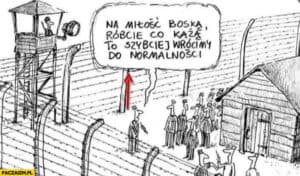Author’s Preface to Computers and Society Report and Essay (2023)
The author presents below his report and essay on computers and society as it was written in Spring 1986, with only very light retouching. Despite being written more than thirty-five years ago, the writing still holds – one might venture to say – a certain level of insight and freshness. It may be said, nevertheless, that one really big technological change between then and now is the coming of the Internet as a truly mass-medium. Whatever all the negative features of the Internet are, it also affords the opportunity for the presentation of broadly divergent, truly philosophical, thought-provoking texts.
Computers and Society: Future Perspectives and Current Dilemmas of Technological Advance
(This report and essay originally written in March/April 1986.)
“STATE-OF-THE-ART” REPORT (Spring 1986)

A Model of a Totalitarian Society based on Computer and Communications Technology
- There are extensive centralized databanks, containing all political and personal information about individuals in the society. Records include psychological/political profiles, identifying those considered “suspect” or “anti-social”.
2) Every individual possesses one authorized “social insurance card” which serves the following functions:
- All economic transactions can only be carried out through the use of this card. This includes food, utilities, transport, etc.
- Each individual is assigned a number of monetary units consistent with his “social worth”, i.e., the extent to which he follows the ruling ideology of the society.
- Access to public transit and all buildings is conditional on the possession of this card. (Similar to modern automated banking outlet entrances.) Could also be used to restrict access to various areas or even towns, and control of all physical travel. (Because of the development of credit-card sized microprocessors with extensive memory, and entire social record could be kept on the card, which could be interfaced in various ways with the central data banks. Thus, an individual might be prevented from buying certain items merely by a command from the central computer, which would have a program for analyzing the political profiles.)
- All independent communications activity and all centralized computer use would be dependent on the possession of this card and of appropriate clearance.
The use of this card gives the rulers of the society vast coercive power. The removal of a card from an individual places him outside society. In order to merely survive, he will have to engage in some kind of criminal activity, sooner or later. Perhaps the system could be circumvented to some extent by barter-trade, which is why further controls are necessary.
(Note that the rulers of the society possess the duplicate of every person’s card, so the effect of losing it should not be disastrous for the loyal citizen. Note that one could provide further checks such as automated thumbprint identification.)
3) Normative control is provided by control of mass media instruments. In all communications media, only the messages and symbols of the ruling ideology are permitted. All mass media, whether print, television, radio, film, video, etc., contain only the messages and symbols of the ruling ideology. The packaging of the material, as “news”, “entertainment”, “information”, is irrelevant – all serve to transmit the ruling ideology.
This control also extends to the print-media, which become a sort of weaker cousin of the audiovisual media.
4) Education is also tightly controlled – all educational textbooks must follow the ruling ideology; computer-assisted instruction, which is heavily used, is saturated with the messages of the ruling ideology.
Thus, all people in the society exist in an environment saturated with the messages, symbols, and images of the ruling ideology. By controlling information, the rulers of the society maintain ideological control. The semantic control which George Orwell predicted in his dystopian novel, Nineteen Eighty-Four, is a salient feature of the society. Words are twisted, robbed of their original meanings, hollowed out, and filled with counterfeit notions. Thus, one even lacks the language with which to criticize the society with real effect.
Since access to the media is reserved only for those who follow the ruling ideology, and since social reality is constructed through the media, no effective challenge can arise to the ruling ideology of the society. (The challenge from independent – underground – publishers, is not likely to be effective.)
5) Further controls exist through the use of two-way televisions (Orwell’s telescreens) which allow for further monitoring of the population. The telescreens can be installed in every home and in every place of work.
(The technology of the “telescreen” already exists, using two-way fiber optics, in which the pixels that make up the screen picture can be used to transmit in both directions.)
Random checks of people at home and at work can betray certain “anti-social” tendencies.
6) Further coercive controls can be applied by the incarceration of individuals classified as “anti-social” in pseudo-psychiatric institutions, release from which is conditional upon a so-called “heart-felt” acceptance of the ruling ideology, whether achieved by physical torture or psychological pressure.
The combination of coercive, utilitarian, and normative controls outlined above can perpetuate a given ideology indefinitely. Note that the use of computer technology as a means of coercive and utilitarian control negates the challenge to normative control which potentially exists in the computer through its potential undermining of the media and information monopoly (for example, through ease of publishing texts).
Note that in a society such as this, military/police power is marginal to the maintenance of social control, and is thus reduced to policing functions whose real aim is the perpetuation of the ruling ideology, rather than the prevention of ordinary crime and the punishment of criminals.
Similarly, the entire judicial/legal system becomes an instrument of the ruling ideology, rather than of justice.
The only threat to such a society lies in conquest by external powers, but it can easily offer the technological and material resources to placate societies ruled by other ideologies. The allure of its technological artifacts is irresistible.
There exist virtually no internal threats to the ruling ideology, apart from so-called terrorist attacks, which are unlikely to lead to significant societal change. The centralized controlling computers can be very heavily guarded, which means it would be extremely difficult to destroy them.

7) One could also note that the use of satellite reconnaissance systems could serve as a further check on individuals who were trying to live in the countryside on their own.
8) Special monitoring systems could be further constructed to keep watch over the environs of cities or important buildings. In many cases, the visual and auditory monitoring could be carried out by computer. Certain key phrases and slight movements in the landscape could be brought to the attention of further monitoring systems, and eventually human controllers.
The formal institutions and formal (elected) government of the society would decline in importance, in favor of loose, ad-hoc groups centered around key elements of the ruling ideology.
One might ask if computer “hackers” with dissident tendencies would not pose a significant challenge to the system, or if perhaps an easy way could be found of circumventing the “social insurance card” system. The answer to this question is that those who could challenge the society would have had to pass through the tight net of the normative control system. Utilitarian and coercive controls would probably be able to keep them in line.
9) In the more distant future, miniature, remotely-controlled explosive devices could be implanted in the bodies of particularly recalcitrant dissidents.
ESSAY (Spring 1986)
The purpose of this essay is to explore the role of the technology of the computer in modern society, as perhaps the most significant technology developed in the history of mankind. Since we are living in the throes of what seems to be “the Computer Revolution”, this exploration is not solely a scholarly exercise, but also involves the raising of important social issues and questions often obscured from most persons’ perceptions. Because of the broad nature of the topic, the approach to it is, of necessity, interdisciplinary, incorporating elements of political science, sociology, philosophy of science, cybernetics, and other relevant disciplines.
The focus of the essay, as the author sees it, is the relationship between technology, especially computer technology, and society. Man is by nature a social animal. Computer technology can only exist and be studied in the broader context of society, specifically the modern technological societies that emerged from, or interacted with, societies collectively known as “Western”. [1]
One might ask what primarily defines the social / economic / political structures (the social environment or system) of a given society. What makes Canadian society so different from Soviet society, for example. It could be argued that the differences in the beliefs, value-systems, and opinions of the governing / ruling / dominant individuals and/or groups in the two respective societies determine the essential differences between the two societies. If the Prime Minister of Canada were a pro-Soviet Marxist, for example, he might do his best to shape the rest of Canadian society in the direction of his beliefs. Thus, the beliefs, value-systems, opinions, and assumptions of the dominant groups/individuals in a society aggregate together into the ruling ideology of that society, which in turn determines the social system or social environment of that society. To have power would mean to have the ability to influence the social environment in a meaningful way consistent with one’s own value-systems. However, the exercise of power is conditioned by the extent to which one’s value-system is in accord with the ruling ideology. Thus, the focus of change in a society is the change of its ruling ideology, usually carried out by the displacement of the current ruling group by other groups and/or persons. [2] (In adopting this model, it is not necessary to establish a definitive explanation for this successive replacement of one ideology over another, nor to choose one ideological paradigm over another, nor to explicitly deny the possibility of a “classless society” at some point in the future.) [3]

The topic “technology and society”, as is clear from the above analysis, must necessarily be focussed on the relationship between technology and various dominant, nondominant, or possible future ideologies / social systems. Central to the essay is the question whether technology (which one should attempt to clearly define) is in fact an autonomous social factor/force with its own ends and priorities (indeed, perhaps the major social factor/force in contemporary society) , or whether it exists merely as a means to ends which are set by (other) ideologies. What is the relationship of technology to these socio-political ideologies? Is there, in fact, an ideology of technology, the politics of technological change/progress? Or is the technological approach to life easily fitted into one, or perhaps even most, ideological systems? Through the exploration of these issues one may attempt to arrive at some understanding of the nature of the so-called “information society” we are said to be living in, of which computer technology may be the most important element.
To begin our exploration of the topic, we might initially ask: “What is technology?” At its most extended sense, the term “technology” can be very broad indeed. It can be related to the anthropological sense of artifact and/or tool – any physical or mental construct (e.g., flint, language) created to aid in man’s control of his environment. [4] A somewhat narrower definition would be any physical object created by man (or natural object used by man) to effect control of his physical and/or social environment. (Control of the physical environment usually implies some control of the social environment.) [5] A further requirement might be that the process of constructing the item of technology should be relatively complex, e.g., Post-Neolithic. One could argue that the distinction between a technological object and artistic object is set entirely in the mind of man. [6] One must also remember that “technology” can refer both to the “skill” necessary to produce and use technological objects, as well as those objects themselves, thus describing both a process and its result.
A more restricted, yet very often used definition, is contained within the terms “modern technology” and “modern technological development”. (The second of these phrases if often rendered as “modern technological change”, as opposed to “progress” or “advance”, as a slight ambiguity becomes associated with technological processes of change.) Technology, in this sense, refers to those technologies peculiar to “modern technological” societies. These technologies (and, quite possibly, the various ideologies specific to those societies) arose as a result of the Industrial Revolution and subsequent technological revolutions and innovations. The Industrial Revolution might be seen as arising from the triumph of the earlier Scientific Revolution, linked with the Enlightenment and seventeenth-century Deism. [7]
One might well as if the computer and associated technologies, especially in communications, do not in fact represent a “quantum leap” from modern, industrial technology, to a “post-modern”, “post-industrial” level of technology. If one holds to a form of technological and economic determinism, one could argue that computer technology would have a nearly incalculable and incomprehensible impact on society. It might be argued that the transformation would be so total there is no point trying to predict it. Entirely new, seemingly bizarre, thought-systems and ideologies would arise. [8] Various concepts, like “the information society” or “the global village” have been advanced by theorists painstakingly groping with these issues. [9]
It might be noted that the concepts of science and technology are closely linked. This might offer one way to move towards discerning the societal impact and implications of technology, by looking at the societal impact and implications of science. Modern science, or the modern scientific method, which prevailed in the nineteenth century over other modes of thought (or can be seen to have prevailed) is certainly an invariable contributor to technological progress. The modern scientific approach to the world can be see as one that excludes other approaches, and can therefore be seen as a sort of rarefied thought-system, which would seem to be able to co-exist (easily or uneasily) with other thought-systems or ideologies. Modern technology could be seen as the praxiological application modern scientific method to social existence by the creation of tools / artifacts / physical objects which for the manipulation and control over the physical, and therefore, the social environment. According to Karl Popper, science is (or should be) an a posteriori, empirical, and non-axiological study of actual or possibly occurring (physical) states of affairs. [10] There might be some question whether this strictly scientific method can justifiably be applied to the study of the realm of social environment and processes. One might also question whether any political theory or thought-system or ideology can be justified as “scientific”. [11]
One could draw the distinction between a thought-system and an ideology here. A mode of thought or thought-system would be any defined / coherent world-view / approach to reality, e.g., William Blake’s poetic cosmogony. Omitting certain areas of human existence from its concern is one way a thought-system deliberately focusses itself. An ideology would be a confluence of several related thought-systems which have been linked together into a socially significant construct in the minds of those persons who govern / rule /dominate the society, as well as among those who seek to replace them. [12]

The scientific/technological thought-system, expressed in ideological form, has had some impact. However, this influence is small compared to the impact of the idea of “science”, and this, in turn, is dwarfed when compared to the impact of technology. Scientific positivism, expounded by Karl Popper and others, could be seen as an “ideology” of science. However, it far more often happens that Science is easily or uneasily joined to another ideological system in order to give it legitimacy in modern eyes. This would seem similar to the invoking of the Bible by both the Catholic Church and Martin Luther to prove opposite points. One should note that there are interpretations of Science which are far different from the conventional positivist one, which allow its co-existence within various ideologies. [13]
It is often argued that the spirit of dynamic technological change lies at the heart of the modern world. It is plain to see that the amount of theoretical scientific knowledge is growing exponentially, as is the number of chemicals / substances / tools / devices which are being produced as a result of the growth of scientific theory. This process is also fuelled y the market economies of North America, Western Europe, and the Pacific Rim. Today, the so-called fifth-generation computer emerges as one of the most advanced technological devices ever developed by man. The process of scientific, technical, and material progress cannot be denied.
Yet what, one may ask, is the End or telos of modern technological society? George Parkin Grant, a classical conservative and Canadian traditionalist-nationalist, reaches a starkly negative conclusion as to the future of technological society. He sees an identity between the “spirit of dynamic technique” and what he calls “corporate liberalism” which is expressed in the desire of mastery of “human and non-human nature” – the essence of modern society or modernity. [14] A thoroughly secular society, possessing no real social or moral ethic, will become a technological hell. Hell, in this sense, means a society deprived of God and the spiritual and transcendent, however superficially materially comfortable. It corresponds largely to the “Brave New World” of Aldous Huxley, where Truth has been abolished and every orifice is incessantly satisfied in a never-ending, mindless hedonism. [15] The development of computer technology would therefore be seen as part of a larger pattern which the computer may drive forward, but never counter-act.
Another bleak picture of the future occurs in George Orwell’s Nineteen Eighty-Four. This book shows the nightmare of the ultimately coercive state beside which Nazi Germany and Stalin’s Soviet Union pale in intensity. One of the book’s brilliant aspects is the illustration of semantic control, exemplified in Newspeak, an artificial language developed for ultimate normative control. In fact, it is stressed that this control of language, of the meanings assigned to different words expressing political and social concepts, is the key to the maintenance of the whole system. The scientifically-directed torture, involving drugs, electric shocks, and special mechanisms, is an element of the novel disturbing in itself, suggesting the ultimate use of technology to enslave man. The telescreens, which are both a monitoring and broadcasting system which is ever-present and unavoidable, ensure continuous control. [16]
In view of these nightmarish views of the future, which are already partially realized in certain areas of the world –e.g., the mindless hedonism of Southern California or Sweden; the psycho-prisons of the Soviet Union (where belief in God is considered a “pathological delusion”); the manipulation of language and music and images by the North American mass media – one hesitates to feel optimistic about the future. [17]
Nevertheless, Marshall McLuhan, the leading media theorist and himself virtually part of popular culture, achieved a sort of cool optimism about the future. His essential ideas, drawn from the works of Harold A. Innis on the role of different writing media in the formation of ancient empires, as well as the technological optimism of Teilhard de Chardin, postulated the formation of a “global village” – a new form of society entirely different from the print-based “Gutenberg galaxy”. [18] This passage gives some feel for McLuhan’s concepts, which, it should be noted, are heavily predicated on the continuing development of communications and computer technology:
This externalization of the senses creates what de Chardin calls the “noosphere” or a technological brain for the world. Instead of tending towards a vast Alexandrian library the world has become a computer, an electronic brain, exactly as in an infantile piece of science fiction. And as our senses have gone outside us, Big Brother goes inside. So, unless aware of this dynamic, we shall at once move into a phase of panic terrors, exactly befitting a small world of tribal drums, total interdependence, and superimposed co-existence. [19]

This, then, is another way of looking at the future in terms more congenial, perhaps, to those who are technologically oriented. One of the salient features of McLuhan’s is the stress on the violence of the transformation from a print-based to an electronic-based society:
We know from our own past the kind of energy that is released, as by fission, when literacy explodes the tribal family unit. What do we know about the social and psychic energies that develop by electric fusion or implosion when literate individuals are suddenly gripped by an electromagnetic field such as occurs in the new Common Market pressure in Europe? Make no mistake, the fusion of people who have known individualism and nationalism is not the same process as the fission of “backward” and oral cultures that are just coming to individualism and nationalism. It is the difference between the A bomb and the H bomb. The latter is more violent, by far. [20]
The Sixties, one may presume, were only the first of far greater social disruptions which will follow before the “global village” society is created and stabilized. As in all theories based on single factors, it is easy to accuse McLuhan of ignoring the role of politics and ideology in his view of the future. Daniel Bell, in his book, The Cultural Contradictions of Capitalism, states, “… the lack of a rooted moral belief system is the cultural contradiction of the society, the deepest challenge to its survival.” [21] This, of course, echoes George Parkin Grant, and other traditionalist-conservative thinkers such as T.S. Eliot and C.S. Lewis.
The question might now be posed if the technology of the computer will aid or hinder in any way, various more positive or more negative outcomes of the future. Since ceaseless dynamism might be seen as the very essence of our society, it might be argued that the computer explosion will only accentuate this tendency, to drive the texture of life forward to such an extent few people can stand it. The author does not see computer technology having the ability to generate a serious change in the ruling ideology. The control of the education system, the academy, the social services, and, above all, the mass media, is all that is necessary to control a modern society. The formal elected government is possibly the last important element in the structure, thus paradoxically undermining the element of democratic choice in a society calling itself “democratic”. It matters little whether we call this system corporate “conservatism” or media “liberalism” or institutionalized “socialism” – it could be argued that it in fact negates the better meanings of all of these concepts. Thus, the computer technology, it seems, will accentuate current trends, without generating new directions in the ideological system. Social change will have to be generated in different ways.
In fact, one might point out here the essential flaw of an “information” society – “information” is a “value-free” category, which might apply equally to a manual on constructing bombs to Plato’s Republic. The central question of a unified value system appropriate to our society remains unresolved, no matter how far technology advances.
Mark Wegierski
=====
Endnotes
- Society is the basic unit by which human existence can be defined. This is the premise of all sociology.
- Note that the term ideology has certain negative connotations, for example, for Marxist thinkers. I am using it here in the sense of a “value-system”. A “ruling ideology” is therefore the dominant value-system of a society. Note that democracy is formally a system where different “ideologies” compete, or which aspires to be “non-ideological”. Practically speaking, it is impossible to be non-ideological or “value-free”: the act of denying all values, except those that arise from individual whim, is itself a statement of value.
- One might argue that democracy is a way of mediating this process of shifting ideologies. However, as democracy is, or has become “liberal democracy” – in fact equated with a certain form of liberalism – these arguments hold little water. It is always important to distinguish the “real” as opposed to the “formal” in politics.
- This approach is based on anthropology, where those notions are constantly examined and re-examined.
- By physical environment, I mean the physical world around us, by social environment, the social system we live in.
- I do not want to get into the whole question of art vs. technology. The state where the creation of a technological artifact was also a process of artistic creation is seen as an ideal. However, this sort of “craft” seems possible only in a pre-Modern society. A critical concept one can consider is that of the “Machine” as opposed to an “organic” creation of man. The imagery of the Machine is very potent and terrifying – the vision of Man reduced to a mechanistic process. Related to this is the notion of extreme alienation that the Machine engenders. It is (or seems to be) the ultimate Other, something remote from Man, yet also created by him. It seems that nothing can ever be the same after the coming of the Industrial Revolution.
- This is often seen as the basic historical pattern of the so-called Modern Era. The beginning of this process can be traced back to the collapse of the authority of the Catholic Church, which sparked the Renaissance. The reaction to the Renaissance was the Reformation. Once the Christian Church had become fragmented and the Protestant notion of individual salvation gained currency, it was an easy step towards individualistic and scientific thought-systems once the initial fervor of faith had been lost. The connection between Protestantism and capitalism has often been traced. A technological or economic determinism would claim the inevitability of this whole process.
- It would seem that an entirely new development in technology would have consequences that are entirely new and cannot be foreseen. Our assessment of this depends heavily whether we are entirely “environmentalists” – or see some irreducible element in human nature and the psyche – such as the collective unconscious and the Jungian archetypes.
- Marshall McLuhan and Alvin Toffler are two of the best-known thinkers in this area.
- This is the logical positivist view of science.
- Since values are, by definition, axiological.
- Note that the omission or ignoring of certain aspects of human existence could be seen as an almost natural process of most thought-systems. Nevertheless, there would be thought-systems which are more essentially true than others. The duty of the political philosopher is to discover the trans-societal, trans-experiential thought which lies behind the values of multiple human societies and to seek to elucidate it, as well as to properly describe current human societies.
- For example, Stanley L. Jaki argues there is no essential conflict between religion and science. Plato’s conception of science was entirely different from Popper’s.
- George Parkin Grant states his fundamental thesis in the short but influential book, Lament for a Nation: The Defeat of Canadian Nationalism – that Canada is doomed in the age of the universal, homogenous, world-state. The irony of his position (which Grant himself recognizes) is that while he sees technological (so-called) “progress” as determining the course of the future, he himself is bitterly opposed to this direction, which will end in the destruction of all that has ever had meaning.
- Aldous Huxley’s Brave New World was a bold, revolutionary work when it appeared in the Thirties. The prophetic extent of Huxley’s vision in uncanny. Huxley explicitly said that he wrote the work to warn of the abuses of a scientific, technicist viewpoint. Brave New World is a material utopia which is nevertheless hell, because God, traditional religion, history, philosophy, real love, and everything else of true value are no longer present in it. Some would say it represents the final result of modern liberalism.
- George Orwell’s Nineteen Eighty-Four is arguably the greatest English political novel, or perhaps the ultimate guide to social and political thought and control. It should be noted that all the worthwhile “eternal verities” absent from Brave New World are doubly absent from Nineteen Eighty-Four. Some would argue that Nineteen Eighty-Four was already partially realized in Nazi Germany or Stalin’s Soviet Union, or even exists to some extent in the Soviet Union of today [1986].
- George Orwell has created an entirely new vocabulary of political words: doublethink, thoughtcrime, reality control, Thought Police, untruth, Big Brother, Ministry of Love, Newspeak, Orwellian, and so forth, which are used in different ways by different people in our society.
- Among McLuhan’s most important works are Understanding Media: The Extensions of Man, and the The Gutenberg Galaxy: The Making of Typographic Man. The concept of the “global village” is generally known.
- The Gutenberg Galaxy, p. 32
- Understanding Media, p. 50
Just what McLuhan’s theories amount to is difficult to arrive at. He seems to be advocating a kind of optimistic technological determinism that reduces whatever actions individual men might take to irrelevance. He seems to say that the problems of society will resolve themselves of their own accord due to this technological determinism. His ideas would therefore seem to justify whatever the ever-changing media status-quo is.
- Bell, Daniel. The Cultural Contradictions of Capitalism, p. 480
The central contradiction as Bell sees it is between a functional, rational, economic sphere and an irrational, antinomian cultural sphere. The disjunction between these two realms threatens to destroy society.
Bibliography
Bell, Daniel. The Cultural Contradictions of Capitalism New York: Basic Books, 1976.
Brantlinger, Patrick. Bread and Circuses: Theories of Mass Culture as Social Decay. Ithaca and London: Cornell University Press, 1983.
Frates, Jeffrey and Moldrup, William. Computers and Life: An Integrative Approach. Englewood Cliffs, NJ: Prentice Hall, 1983.
Grant, George. Lament for a Nation:The Defeat of Canadian Nationalism. Ottawa: Carleton University Press, 1979 [1965].
Huxley, Aldous. Brave New World. Harmondsworth, England: Penguin Books, 1975 [1932].
McLuhan, Marshall. The Gutenberg Galaxy: The Making of Typographic Man. Toronto: University of Toronto Press, 1965 [1962].
McLuhan, Marshall. Understanding Media: The Extensions of Man. New York: McGraw-Hill, 1965 [1964].
Orwell, George. Nineteen Eighty-Four. New York: Penguin Books, 1984 [1949].
Roszak, Theodore. The Cult of Information: The Folklore of Computers and the True Art of Thinking. New York: Pantheon, 1986.
Toffler, Alvin. The Third Wave. New York: Bantam Books, 1980.
Zoll, Donald Atwell. The Twentieth Century Mind. Baton Rouge: Louisiana State University Press, 1967.
Sociologist Mark Wegierski holds a Master of Library Science, among other degrees.



